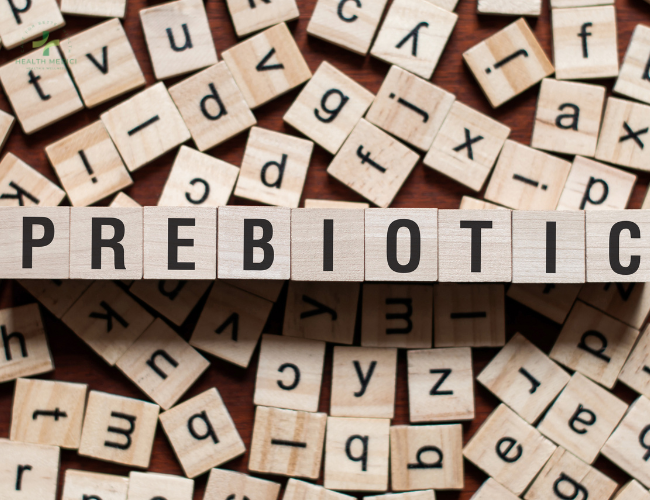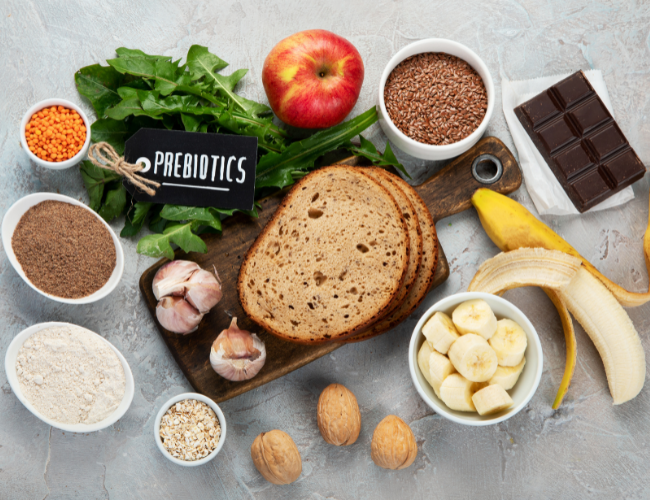Explore the differences between probiotics and prebiotics and focus on the best sources of prebiotics to incorporate into your diet for optimal gut health.

Maintaining good digestive health is essential for overall well-being, and a thriving gut microbiome is vital in achieving this. While probiotics have gained popularity for their beneficial impact on gut health, prebiotics also deserves the spotlight. Prebiotics are non-digestible fibers that serve as nourishment for beneficial gut bacteria, helping them flourish and support a balanced digestive system.
What’s the Difference between Probiotics and Prebiotics?
Prebiotics and Probiotics are both related to gut health and play important roles in maintaining a healthy digestive system, but they are different in their functions and sources.
Probiotics
- Definition
Probiotics are live microorganisms, usually bacteria or yeasts, that are beneficial for your digestive system when consumed in adequate amounts.
- Function
These beneficial microorganisms help maintain a balance of gut bacteria by increasing the population of good bacteria in the digestive tract. They can aid in digestion and support the immune system.
- Sources
Probiotics can be found in certain fermented foods like yogurt, kefir, sauerkraut, kimchi, miso, and some types of pickles. They are also available as dietary supplements in the form of capsules, powders, or drinks.
Prebiotics
- Definition
Prebiotics are non-digestible dietary fibers that serve as food for the beneficial bacteria in your gut.
- Function
They provide nourishment and support the growth and activity of probiotics, helping them thrive and maintain a healthy gut environment. Prebiotics essentially acts as a fertilizer for the good bacteria in your digestive system.
- Sources
Prebiotics are found in certain foods, such as bananas, onions, garlic, leeks, asparagus, chicory root, whole grains, and some legumes.
In general, probiotics are the live beneficial microorganisms themselves, while prebiotics are the indigestible fibers that provide a food source for these good bacteria. By consuming both probiotic-rich foods or supplements and prebiotic-containing foods, you can promote a healthy gut microbiome, which is crucial for overall digestive health and immune function.
Best Prebiotics Foods

The best sources of prebiotics are foods that contain high amounts of dietary fibers, particularly certain types of fibers known as “oligosaccharides.” These indigestible fibers serve as fuel for the beneficial bacteria in your gut, promoting their growth and activity.
Here are some excellent sources of prebiotics
- Chicory Root
Chicory root is one of the richest sources of prebiotics. It can be consumed roasted and ground as a coffee substitute or added to foods as a fiber supplement.
- Jerusalem Artichoke
Also known as sunchokes, Jerusalem artichokes are high in inulin, a type of prebiotic fiber.
- Garlic
Garlic is not only a flavorful addition to many dishes but also a good source of prebiotics.
- Onions
Onions, particularly raw ones, contain prebiotic fibers like inulin and fructooligosaccharides (FOS).
- Leeks
Leeks are part of the Allium family, like garlic and onions, and contain similar prebiotic fibers.
- Asparagus
Asparagus is a delicious vegetable that provides prebiotic benefits.
- Bananas
Unripe bananas, in particular, are rich in resistant starch, a type of prebiotic fiber.
- Barley
Barley is a whole grain that contains prebiotic fibers, making it a good addition to your diet.
- Oats
Oats are a great source of beta-glucans, a type of prebiotic fiber.
- Legumes
Lentils, chickpeas, and beans (e.g., navy beans, kidney beans) contain various prebiotic fibers that support gut health.
- Cocoa and Dark Chocolate
Yes, you read that right! Cocoa and dark chocolate, in moderate amounts and with low sugar content, can provide prebiotic benefits due to their content of fibers like inulin.
Incorporating these prebiotic-rich foods into your diet can work wonders for your gut health and overall well-being. However, it’s essential to introduce these foods gradually, especially if you are not accustomed to consuming high-fiber foods regularly. Sudden large increases in prebiotic intake may cause temporary digestive discomfort for some individuals. Start with smaller portions and allow your gut microbiome time to adapt and benefit from their positive effects.
Takeaway
A healthy gut is fundamental to overall health, and prebiotics play a crucial role in supporting the beneficial bacteria that reside in our digestive system. By incorporating prebiotic-rich foods into your diet, such as chicory root, Jerusalem artichokes, garlic, onions, asparagus, bananas, barley, oats, legumes, and even cocoa and dark chocolate, you can nourish your gut microbiome and promote better digestion and immune function. As with any dietary changes, introduce these foods gradually and enjoy the flavorful journey to better gut health.


